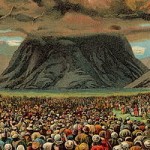Revelling in Revelation
 As Z’man Mattan Toratenu, “The Time of the Giving of our Torah”, Shavu’ot celebrates Revelation – a key concept in Judaism but, as an American rabbi once said, it is “like socialism, a tabooed word, truly beautiful in significance, but poorly understood”.
As Z’man Mattan Toratenu, “The Time of the Giving of our Torah”, Shavu’ot celebrates Revelation – a key concept in Judaism but, as an American rabbi once said, it is “like socialism, a tabooed word, truly beautiful in significance, but poorly understood”.
What a lovely story it was when we were children. Vast crowds of people camped at the foot of a mountain, majestic displays of thunder and lightning, a voice booming from the heavens… the drama and excitement were almost unbearable.
But then scientific man came onto the scene of history. It could never have happened, he sneered. The whole thing was imagined, he snorted. Voices don’t really boom from heaven, or even from mountain tops. It’s all a fairy story.
Yes, there is a message about not killing, stealing or committing adultery. But it emerged out of human experience. People needed it, and so it came to be. Vox populi, vox dei.
That of course is putting the objections to Revelation rather crudely. The historians of religion use more sophisticated language. What they talk about is spiritual feeling, emotional inspiration and similar jargon.
It all boils down to the same result: Revelation in the traditional sense is simply unbelievable.
The traditionalist is unmoved. Why should the story not have happened? Does God need to explain every step He takes? Even if He did explain it, is there any guarantee that finite man would completely understand?
If man understood everything about God and His ways, then the roles would never be the same again. Man would be God and God would be man. As the medieval theologians put it, lu yedativ heyitiv, “If I knew Him, I would be Him”.
Do I even need to know it all for certain? Is it not enough to know that by an act of grace, God bursts upon human history and communicates on whatever level to prophets and to ordinary people alike? I surely do not need to tame the Divine to such an extent that I can inspect its details under the microscope of scientific analysis or historical method.
There are things I am never going to know about God, but they do not prevent me from knowing He is there and that His word is precious.



